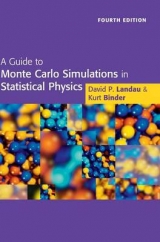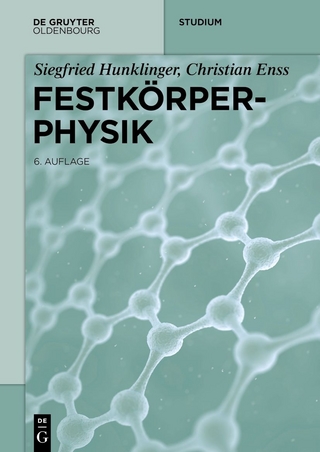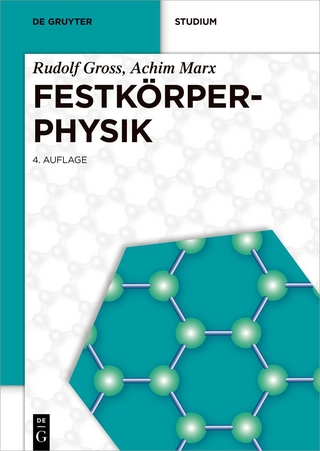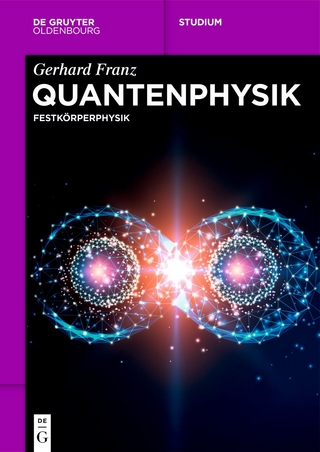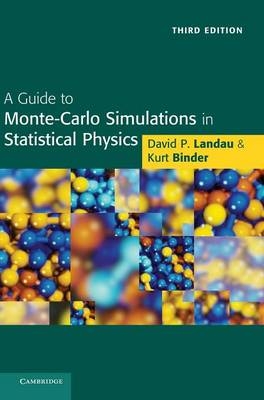
A Guide to Monte Carlo Simulations in Statistical Physics
Cambridge University Press (Verlag)
978-0-521-76848-1 (ISBN)
- Titel erscheint in neuer Auflage
- Artikel merken
Dealing with all aspects of Monte Carlo simulation of complex physical systems encountered in condensed-matter physics and statistical mechanics, this book provides an introduction to computer simulations in physics. This edition now contains material describing powerful new algorithms that have appeared since the previous edition was published, and highlights recent technical advances and key applications that these algorithms now make possible. Updates also include several new sections and a chapter on the use of Monte Carlo simulations of biological molecules. Throughout the book there are many applications, examples, recipes, case studies, and exercises to help the reader understand the material. It is ideal for graduate students and researchers, both in academia and industry, who want to learn techniques that have become a third tool of physical science, complementing experiment and analytical theory.
David P. Landau received a BA in Physics from Princeton University in 1963 and a Ph.D. in experimental Physics from Yale University in 1967. After doing postdoctoral research at the CNRS in Grenoble, France and teaching at Yale for a year he moved to the University of Georgia where he initiated a research program of Monte Carlo studies in statistical physics. He is currently the Distinguished Research Professor of Physics and founding Director of the Center for Simulational Physics at the University of Georgia. He has been teaching graduate courses in computer simulations since 1982. He has authored/co-authored more than 370 research publications and edited/co-edited more than 20 books. David Landau is a Fellow of the American Physical Society and a past Chair of the Division of Computational Physics of the APS. He received the Jesse W. Beams award from SESAPS as well as Humboldt Fellowship and Humboldt Senior US Scientist awards. The University of Georgia named him a Senior Teaching Fellow in 1993. In 1998 he also became Adjunct Professor at the Helsinki University of Technology. In 1999 he was named a Fellow of the Japan Society for the Promotion of Science. In 2002 he received the Aneesur Rahman Prize for Computational Physics from the APS, and in 2003 the Lamar Dodd Award for Creative Research from the University of Georgia. In 2005 he became the Senior Guanbiao Distinguished Professor (Visiting) at Zhejiang U. in China. In 2007 he received the Nicholson Medal for Human Outreach from the APS. He is currently a Principal Editor for the journal Computer Physics Communications. Kurt Binder received his Ph.D. in 1969 at the Technical University of Vienna. His thesis dealt with Monte Carlo simulations of Ising and Heisenberg magnets, and since then he has pioneered the development of Monte Carlo simulation methods in statistical physics. From 1969 until 1974 Kurt Binder worked at the Technical University in Munich, interrupted by a stay as IBM postdoctoral fellow in Zurich in 1972–3. After a year at Bell Laboratories in Murray Hill, NJ (1974) and a first appointment as Professor of Theoretical Physics at the University of Saarbrücken back in Germany (1974–7), he was awarded a joint appointment as Full Professor at the University of Cologne and as one of the Directors of the Institute of Solid State Research at Jülich (1977–83). He has held his present position as Professor of Theoretical Physics at the University of Mainz, Germany, since 1983, and since 1989 he has also been an external member of the Max-Planck-Institut for Polymer Research at Mainz. Kurt Binder has authored/co-authored more than 900 research publications and edited 5 books dealing with computer simulations. Kurt Binder received the Max Planck Medal of the German Physical Society in 1993. He also acts as Editorial Board member of several journals and has served as Chairman of the IUPAP Commission on Statistical Physics. In 2001 he was awarded the Berni Alder CECAM prize from the European Physical Society. In 2007 he received the Boltzmann Medal from the International Union of Pure and Applied Physics, and was named one of the first Gutenberg Fellows at the University of Mainz.
Preface; 1. Introduction; 2. Some necessary background; 3. Simple sampling Monte Carlo methods; 4. Importance sampling Monte Carlo methods; 5. More on importance sampling Monte Carlo methods of lattice systems; 6. Off-lattice models; 7. Reweighting methods; 8. Quantum Monte Carlo methods; 9. Monte Carlo renormalization group methods; 10. Non-equilibrium and irreversible processes; 11. Lattice gauge models: a brief introduction; 12. A brief review of other methods of computer simulation; 13. Monte Carlo simulations at the periphery of physics and beyond; 14. Monte Carlo studies of biological molecules; 15. Outlook; Appendix; Index.
| Erscheint lt. Verlag | 10.9.2009 |
|---|---|
| Verlagsort | Cambridge |
| Sprache | englisch |
| Maße | 180 x 254 mm |
| Gewicht | 1100 g |
| Themenwelt | Naturwissenschaften ► Physik / Astronomie ► Festkörperphysik |
| Naturwissenschaften ► Physik / Astronomie ► Thermodynamik | |
| ISBN-10 | 0-521-76848-9 / 0521768489 |
| ISBN-13 | 978-0-521-76848-1 / 9780521768481 |
| Zustand | Neuware |
| Informationen gemäß Produktsicherheitsverordnung (GPSR) | |
| Haben Sie eine Frage zum Produkt? |
aus dem Bereich
